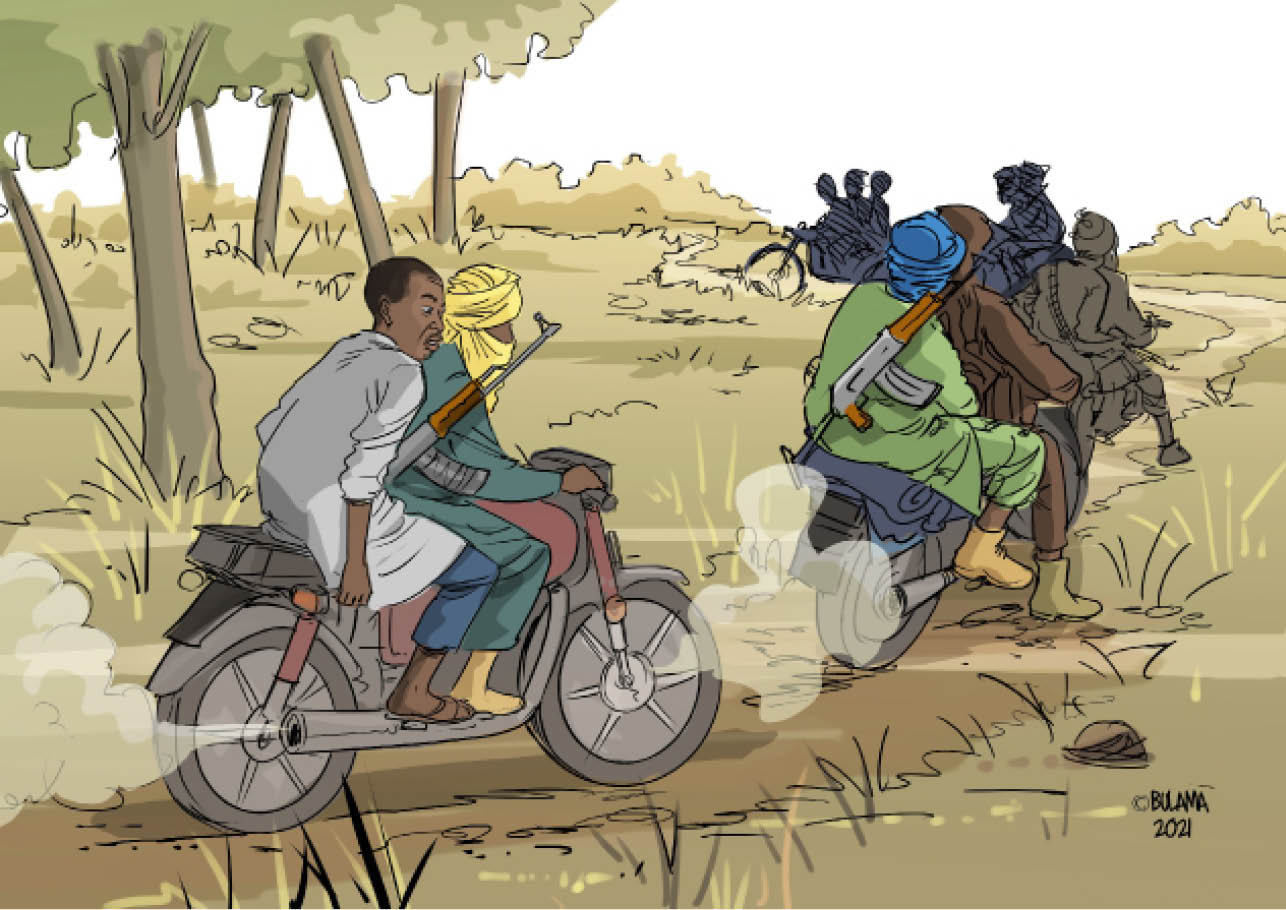Embarking on a reporting trip to the den of bandits in the far northern part of Zamfara State, close to the border with Sokoto State, required more than journalistic curiosity. Our reporter shares his experience.
It was a bit confusing trying to locate the spot, signposted by a locust-bean tree. It’s the rendezvous appointed by Shehu Rekeb, the bandits’ leader we were coming to see. It was Monday, February 17. When the final details about the trips were confirmed the night before, Rekeb said we should meet there between 10 to 11 o’clock in the morning. The place is the outskirts of Sububu forest, off the road between Shinkafi in Zamfara and Sabon Birni in Sokoto State.
As the clock ticked closer, I was downed by apprehension. The communication channel was no longer available, and I was, therefore, unable to get through to affirm the appointment and communicate a change in time due to some challenges. We, however, gambled to hit the road, the initial challenges notwithstanding.
The journey to Shinkafi from Gusau, I was told, would last about two hours through Kasuwar Daji, Kauran Namoda and Moriki. When I arrived in Gusau the previous Tuesday, my colleague, who was my first point of call, had warned me about plying most, if not all the roads linking the state capital with most of the local government areas. The warning was in different degrees. For some places, he said, one could go and come back quickly under the stare of the sun. For others, he said, the danger was high, even during the day. Shinkafi falls among the latter.
The problem, according to my colleague, was often not the journey to those danger zones, but the trip back. Informants abound in many communities, I was warned repeatedly. The presence of new faces or passage of unusual vehicles get reported to the bandits, who lurk quite close in many of these places. They could then give a chase or waylay such strangers on their return journey. One, therefore, would have to blend, as much as possible.
I tried to blend by using an old drab jellabiya with a dissimilar trousers. I also refused to chatter a car to myself, opting instead to use the jam-packed public transport. I travelled to Mayanci, this way, and also attended the Tsafe market on Sunday.
On the morning of Monday, it was in the same dress that I appeared as we headed to the central motor park in Gusau to pick the ride to Shinkafi.
The man we were to see, Shehu Rekeb, is a rather mysterious character in the Zamfara, nay northern Nigerian, banditry chess game.
When I called a local contact in Shinkafi town to inform him about my planned trip, he could not believe when I mentioned the person I was going to meet. Rekeb had been heard of, he later told me, but he did not know of anyone who had met him or even had a contact with him. Though he relates more closely with Halilu, the more well-known bandits’ leader operating around Shinkafi, Shehu Rekeb is more than a local player. He is a veteran of rural banditry who, by his age and experience, serves more like an ideologue to the hundreds of young men that are with him in the bush. To Rekeb, Halilu is a son, having been friends with Halilu’s father, prior to his venture into the underworld.
He was initialy hesitant, but by the time his interest in speaking out was established, he became more forthcoming. I spoke with him about 10 times in the last two days since the evening when I was linked up with him over the phone. He sounded reluctant that evening, including warning against him being recorded without his knowledge. My interlocutor had to do some more talking to convince him to give me the opportunity. In giving his consent, however, he requested that a radio station be involved because, as he said, it is radio that they have access to. This request would have to be met.
In ‘touch’ with AK-47
As our local guide parked the Toyota car by the tree, I quickly opened the rear right door. I hastened because, in my mind, any delay could heighten the suspicion in the minds of our host. It was a mutually suspicious interaction in which, in spite of assurances on both sides, some level of apprehension lurked somewhere in the minds of all of us. Though I personally had no doubts, our local guide kept warning about the unpredictability of the bandits. He insisted that we demand that they send someone to lead, as Rekeb himself suggested initially, instead of us walking into them. This further tensed up my colleague, the elderly Mallam Sani.
There they were, about seven of them, each with an AK-17 rifle dangling from his shoulder. As I banged the door to close, I salaamed at them, as a way of cutting the ice. “My name is Abdulaziz. I am the person communicating with Shehu,” I said in Hausa. I was hoping one of the masked men was Shehu Rekeb. I was wrong.
“You are the one,” one of them retorted in English. I was astonished. “Leave your car there,” he added, as he motioned his men to start their motorcycles. He asked the three of us to jump on. It was a moment of helpless dazzle. This was where we agreed to meet, but where were Rekeb and Halilu? No one could ask any question. I hopped on one of the motorcycles, with a fair-skinned lanky young man in charge. We rode in high speed for about 10 minutes through the sandy footpaths, mastered only by these men who are lords of the terrain. An AK-47 rifle slung on the rider’s right shoulder, oscillated around my thigh. It was the closest I ever came to the killer-machine.
The face-to-face
I sighed when I sighted a semblance of human presence under a big tree. It was a big shed under which there were about two dozens of men and 15 or more motorcycles. Most of them were standing around the bikes while few sat on a mat and a rug spread on the ground.
I was the first to arrive among the three of us, that made it more awkward. I blabbed some introduction, and in a moment, a thin man in military camouflage and turban rose from the rug and extended his hands, a cigarette stick burning on the other hand. We greeted and he asked me to sit on the mat beside me.
Speaking to Rekeb for the first time on the phone, his ascent came across as foreign, with a few exclamation in pidgin French. This riddle would, however, be resolved when we eventually meet through his copious references to his origins, happenings in Nigeria overtime and his interaction with local issues and naming a local leader who has since died, showed that he is indeed a local man.
The relationship to French found in his tongue could only mean a long and deep relationship with our West African neighbours. This much was confirmed to me later by a source who made the note about Rekeb’s relationship with similar insurgent groups in Niger and elsewhere. He too, in our interview (published last weekend), showcased his knowledge of the armed uprisings by Fulani groups in Niger, Burkina Faso and Mali.
Takeaways
My nine days in Zamfara and the trip to Sububu brought out a number of takeaways about the problem of banditry bedevilling Zamfara and elsewhere in northern Nigeria.
The armed men I saw bore heavy arms they used for attacks and defence. These assault rifles have been used to kill, maim and dislodge a lot of innocent citizens. These forests and their surroundings have been turned into a real jungle, where life is the Hobbesian “short and brutish.” Access to arms has created the rise of warlords, who wax stronger with more arms and men.
There is despair and anger across divides with the Fulani (herders) and Hausa (farmers) communities bearing the brunt of what is a clear case of neglect and leadership crisis, which degenerated and turned this once peaceful parts of the country into killing fields.
One repentant bandit told me of how a pregnant woman was ripped open and her baby brought out from her womb. I have heard so many atrocities committed by the Fulani armed men in the name of retaliation for a heinous act like the one I mentioned above.
With capacity issues dogging the security forces, I foresee a long-drawn crisis in our hands, except for a drastic review of the kinetic measures. It is in this light that one sees wisdom in using non-kinetic measures to extinguish this flame that is fast raging into a ravenous inferno.

 Join Daily Trust WhatsApp Community For Quick Access To News and Happenings Around You.
Join Daily Trust WhatsApp Community For Quick Access To News and Happenings Around You.


